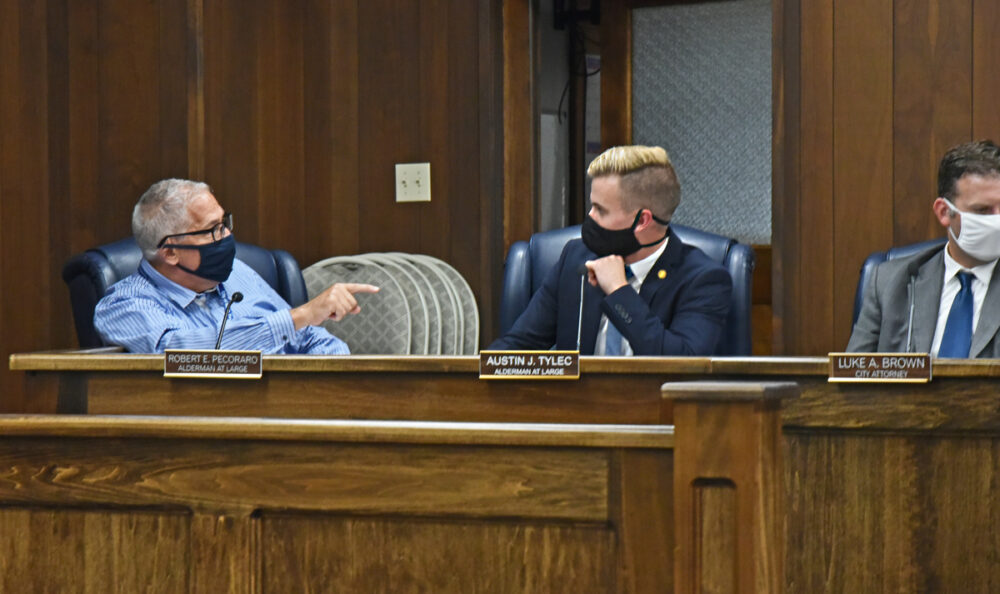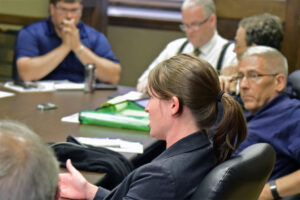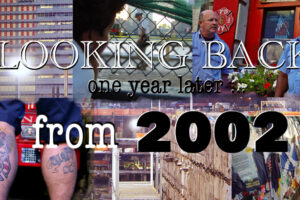Looks like North Tonawanda, Austin Tylec is getting that ethics review board after all

An NT resident who submitted an ethics complaint and waited two years for a response has now been told in writing the process to establish an ethics review committee will begin “immediately.”
The effort to establish an ethics review board began shortly after Austin Tylec was elected as Alderman at Large. Tylec even wrote a resolution about it that was soundly shot down by the Republican council majority.
As Robert Pecoraro — Alderman at Large and Republican mayoral candidate — said at the time: If we agree to an ethics board that must mean there’s something wrong.
According to BJ VanDewater — over the years one of the most active NT residents when it comes to local governance — there is something wrong.
Submitted in Nov. 2018, VanDewater’s complaint says Mayor Arthur Pappas acted unethically when he made out-of-place comments defending the decision to go with an accounting firm summarily rejected by the city’s department head in charge of the search, and not disclosing he had received a political donation from that company.

Former NT head accountant Amanda Reimer discussing with the council best practices for handling the city’s finances. She also fought against re-hiring the Amato, Fox and Company accounting firm, saying it was common practice to switch auditing firms after five years. NT had been with Amato Fox for decades at that point.
After County Attorney Claude Joerg told the city council and Vandewater its ethics board does not handle cases in NT, the matter was handed over to NT’s city attorney Luke Brown.
Fast forward to Monday, April 26, 2021, and an email sent by VanDewatersent to Brown and all members of the city council drew a response from two of them.
Pecoraro: “I understand the timing of this complaint and find it unacceptable that we don’t have an established Ethics review process in North Tonawanda. We were told that if we didn’t have an Ethics Review Committee, the County by default was to adjudicate the issue. Unfortunately, this was to be found untrue and therefore, I will immediately start the process to establish a Ethics Review Committee.”
Tylec responded: “Feel free to use wording from the one I proposed to the Council in 2019. Happy to help organize this, I still believe it’s a great idea.”
VanDewater also had this to say to Pecoraro’s response: “When will I get a response to the issue I raised over two years ago? I have already heard people say things along the lines of we need an ethics committee, or we will create some committee to handle any issue a resident may raise. I want to know what progress has been made, particularly as my issue directly related to the selection of city auditors. We all know what the result was when the State Comptroller audited the city’s finances, and that one result was the exorbitant increase in city property taxes for this year.”
VanDewater finished with: “So, to be clear, please tell me what progress, if any has been made, what are the next steps, and when will they happen.”
Not only is an ethics review board necessary for dealing with issues like the mayor’s intervention in selecting an accounting firm explicitly ruled out by the head accountant for unprofessional practices and failing to disclose he accepted a campaign contribution from the firm.
It’s also important to establish what are “best practices” when it comes to city officials and how they deal ethically with potentially problematic situations like campaign donations among other issues.
It’s clear from the lack of action in forming an ethics review committee after the county said NT could not rely on theirs — as well as the initial flat-out rejection of the idea — the Republican majority has come of age during a time of little oversight and perpetuated a culture that does not even consider or understand what is ethical behavior and where the lines are that shouldn’t be crossed.
This is something that needs to be discussed openly and put into written language.
It should be a wholly bi-partisan effort — in fact, I’d go as far to say this shouldn’t be acted on until after the November election — with a strong community representation as well as actual experts on the matter of governmental ethics.
VanDewater’s original ethics complaint: (Tylec’s ethics board resolution follows)
The issue I would ask to be reviewed by the Board of Ethics occurred at the North Tonawanda Common Council meeting on October 2, 2018. The agenda for that meeting can be found on the web at the URL http://www.northtonawanda.org/event/100168/common-council
The minutes of the meeting are also available on the web at the URL http://www.northtonawanda.org/file-library/category/october_2018
There is also a video recording of that meeting on the web at the URL https://www.youtube.com/watch?v=BK4vd6mje7A&t=3336s
The issue I am writing about is discussed in the video beginning at the 56:32 mark of the video recording.
I was unable to attend that council meeting due to a family situation. I first became aware of the city auditor issue when I read an online article that discussed it several days later on Facebook. The item under discussion is number VII.3 on the agenda, Award of Bid for the independent Certified Public Accountants to provide services related to the audit for the city of North Tonawanda.
The discussion began with the city accountant explaining the RFP process, and also explaining the rationale for her recommendation. In summary, the RFP was sent to five different firms, four of them responded, and one did not. The RFP was not sent to the city’s current audit firm for a number of reasons. The city accountant listed those on the video recording. The three main reasons were:
- For publicly traded institutions it is actually the law to change the auditor every five years. It is a strongly recommended practice for public institutions to do the same. The city’s current audit firm, Amato Fox & Company has been doing audits for the city for over 35 years.
- The city accountant also pointed out that if the audit firm made a significant mistake, then the city could be liable to a fine under certain conditions. This is a financial risk for the city.
- There have been several ongoing problems with the current audit firm that the city accountant detailed in the video recording.
In the spirit of full disclosure, I found the city accountant’s case to be a very strong one, and were I to have had a vote, I would have supported it.
Additionally, as I researched this issue I learned that this firm, Amato, Fox and Company, were blamed for some of the City of Lockport’s fiscal challenges in a newspaper article. In that article, among other things, one can find this quote from the New York state Comptroller’s office: “… we believe that the audit work papers were deficient in certain key areas including audit documentation, testing and supervision”. The city of Lockport no longer uses Amato, Fox and Company as their auditors. This article can found on the web at the URL https://www.lockportjournal.com/news/local_news/accounting-firm-blamed- for-some-of-city-s-fiscal-challenges/article_47a14779-f5b8-5d81-9c51- 554453ba8fe1.html
Also, from my own personal experience, when handling responses to RFPs, when a bid on an RFP was more than 20% below the average, it would not be considered. There are a number of reasons for this, the main one being that the responder probably did not fully understand the RFP. The bid from Amato, Fox and Company was more that 45% below the average bid of the other four responders.
In the video recording at 58:43 the city accountant points out that the response to the RFP from Amato Fox and Company was incomplete. I interpreted this to mean that the response was not a valid response to the RFP. This also brought me to consider why it was even in the agenda.
At this point in the video recording something very unusual occurred. Normally, when a city department head submits a proposal, it gets voted on. Not every proposal from a city department head is approved. However, in the past three plus years I have been attending the city council meetings, they have always been voted on. This proposal failed to get a second for a vote.
A relatively long discussion ensued, which can be viewed on the video recording. Another motion was made to use the firm with the lowest bid. This also did not get a second. The discussion continued with several ideas being proposed centered on accepting Amato, Fox and Company as the city’s auditor for a period of one year. A counter proposal was made to use the firm recommended by the city accountant for one year. Then, at 1:06:28 of the video the mayor weighed in, speaking in favor of Amato Fox and Company for the one-year time period. A motion was then made, seconded, and approved to award the contract to Amato Fox and Company for another year.
The more I looked into this, the more I was concerned that the behavior of two of the city’s elected officials may have been influenced by campaign contributions.
The first official is the city clerk, Daniel Quinn. While he did not take part in any of the discussion on the video recording, his office is responsible for handling RFPs. Given that Amato Fox and Company were not invited to respond, it is not clear to me exactly how they become a part of the process. However, it did require the involvement of Mr. Quinn’s office. Richard Ertel, a partner in the firm of Amato Fox and Company, made three contributions to the committee supporting Mr. Quinn’s election in 2015. Additionally, even though Mr. Quinn was not running for reelection in 2018, Richard Ertel made a contribution to the same committee in May of 2018. These contributions are documented on the New York state Board of Elections Disclosure Reports web page. The URL for this is https://www.elections.ny.gov/CFViewReports.html
The second city official is the city mayor, Arthur Pappas. In both of his election campaigns he has received direct contributions from the firm of Amato Fox and Company. He did not make this clear before he spoke in favor of the one-year proposal for Amato Fox and Company. I would have thought that the mayor would either not have spoken on the issue at all, or the mayor would have acknowledged that he received these contributions before speaking.
From my viewing of the video recording, it was the mayor who actually drove the discussion to a close, leading to a vote to accept a firm that the city accountant did not deem qualified to continue as the city’s auditor. One reason proposed was it would impact the city budget, yet the city accountant pointed out that the bids from the recommend firm were already in the budget for next year (this meeting took place after the 1 October deadline for completing the recommend budget).
All of this together makes it seem to me that undue influence of one or more city officials led to the approval of a firm that did not properly respond to the RFP, a firm that has not properly executed its responsibilities in the past, and the result is that the city may be at risk of financial penalties if, as in the city of Lockport, the audit firm fails to perform its duties.
I would welcome the opinion of the Board of Ethics on this issue.
Tylec’s Ethics Board Resolution
A RESOLUTION SUBMITTED BY ALDERMAN-AT-LARGE AUSTIN TYLEC RE: Creation of Ethics Board
WHEREAS, an ethics board’s membership may be comprised of appointed citizens; and
WHEREAS, the members selected for the board need be fair-minded, unbiased, diligent members of the community; and
WHEREAS, the purpose of an ethics board is to provide external oversight of a city’s compliance with ethics regulations; and
WHEREAS, the duties of an ethics board consist of adopting regulations pertaining to ethics regulations, investigating ethics complaints, and recommending penalties; and
WHEREAS, municipalities have adopted ethics boards that enforce a value-based ethics code which provided examples of what conduct did and did not reflect certain values such as fairness, trustworthiness, responsibility, and respect; and
WHEREAS, citizens of North Tonawanda have brought forth ethics related complaints regarding city officials and employees and have not received resolutions to their issues; and
WHEREAS, in correspondence received by the City Attorney’s Office, dated April 3, 2019, Niagara County Attorney Claude A. Joerg has stated that citizen’s complaints are outside the purview of the Niagara County Board of Ethics; and
WHEREAS, North Tonawanda lacks a code of ethics that provides standards for officers and employees with respect to disclosure of interest in legislation before the local governing body, holding of investments in conflict with official duties, private employment in conflict with official duties, future employment and such other standards relating to the conduct of officers and employees which is supported by Article 18, §806, Subsubsection 1 (a) of New York State General Municipal Law.
NOW, THEREFORE, BE IT
RESOLVED, that the city of North Tonawanda, in accordance with Article 18, §808, Subsubsection 3 of New York State General Municipal Law, shall establish a local board of ethics; and, be it further
RESOLVED, that the board shall be comprised of seven (7) members; and, be it further RESOLVED, that the board shall have all the powers and duties of, and shall be governed by the same conditions as, the county board of ethics, with the exception that it shall only act with respect to officers and employees of North Tonawanda; and, be it further
RESOLVED, that the ethics board shall create their own bylaws as they deem necessary which shall require approval by the Common Council prior to implementation; and, be it further
RESOLVED, that the members shall be appointed to serve at the pleasure of the appointing authority; and, be it further
RESOLVED, that each Councilmember, the Mayor, and the City Attorney shall each provide one (1) recommendation of a candidate to be appointed to the board; and, be it further
RESOLVED, that the City Attorney’s recommendation shall be an employee of the City Attorney’s Office to fulfill the requirement of at least one member of the board being an elected or appointed municipal officer or employee per Article 18, §808, Subsubsection 3 of New York State General Municipal Law; and, be it further
RESOLVED, that each member shall serve the board until the end of each calendar year, the vacancy to be filled at the first regular session of the Common Council every year; and, be it further
RESOLVED, that no term limits shall be placed on a member of the committee; and, be it further
RESOLVED, that vacancies occurring prior to the term’s completion shall be filled by the officer of the position in which the original appointment was recommended; and, be it further
RESOLVED, that the Ethics Board shall not require a separate budget nor staff; and, be it further
RESOLVED, that the City Clerk’s office shall provide administrative assistance as needed.






































